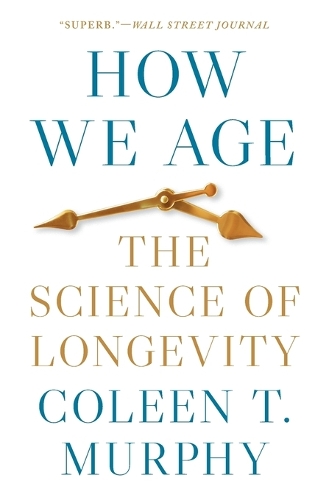
How We Age: The Science of Longevity
(Paperback)
Available Formats
Publishing Details
How We Age: The Science of Longevity
By (Author) Coleen T. Murphy
Princeton University Press
Princeton University Press
1st August 2025
United States
Classifications
General
Non Fiction
Cellular biology (cytology)
Medical genetics
Anatomy
Physiology
Neurosciences
612.67
Physical Properties
Paperback
464
Width 133mm, Height 203mm
Description
How recent breakthroughs in longevity research offer clues about human aging
All of us would like to live longer, or to slow the debilitating effects of age. In How We Age, Coleen Murphy shows how recent research on longevity and aging may be bringing us closer to this goal. Murphy, a leading scholar of aging, explains that the study of model systems, particularly simple invertebrate animals, combined with breakthroughs in genomic methods, have allowed scientists to probe the molecular mechanisms of longevity and aging. Understanding the fundamental biological rules that govern aging in model systems provides clues about how we might slow human aging, which could lead in turn to new therapeutics and treatments for age-related disease.
Among other vivid examples, Murphy describes research that shows how changing a single gene in the nematode worm C. elegans doubles its lifespan, extending not only the end of life but also the youthful, healthy part of life. Drawing on work in her own lab as well as other recent research, Murphy chronicles the history and current state of the field, explaining longevity's links to reproduction and mating, sensory and cognitive function, inheritances from our ancestors, and the gut microbiome. Written with clarity and wit, How We Age provides a guide to the science: what we know about aging, how we know what we know, and what we can do with this new knowledge.
Reviews
"Finalist for the PROSE Award in Biological Sciences, Association of American Publishers"
"Murphy has gathered a huge amount of research material on longevity, giving the book a tone of meticulous authority" * Kirkus Reviews *
"[An] informative deep dive into the research behind living longer and the aging process."---Tom Wilk, New Jersey Monthly
"Meticulous. . . . [Murphy's] sweep is vast as she discourses on diet, exercise, insulin signaling and the genes that affect longevity. In her final, superb chapters, she takes on the associations between the human microbiome and cognitive deterioration, wrapping up with a look ahead to emerging drug therapies."---Hamilton Cain, Wall Street Journal
"In How We Age, geneticist Coleen Murphy provides no silver bullets for remaining youthful. Rather, she offers a scholarly account of the state of ageing research that is both lively and personal. She also gives real insight into the ups and downs of leading a research laboratory. . . . How We Age will be particularly useful to researchers, but it should also appeal to general readers who want to know what it took to arrive at the current understanding of ageingand the prospects of undergoing it in better shape."---Linda Partridge, Nature
"A lucid and detailed overview of the field."---Stephen Cave, Financial Times
"Interesting reading on the state of reductionist gerontology. . . . Since the author is a leading nematode gerontologist, her views on the rest of the field of reductionist gerontology are well worth reading."---Michael R.. Rose, The Quarterly Review of Biology
"Recommended."---J. Clawson, Choice
Author Bio
Coleen T. Murphy is director of the Lewis Sigler Institute of Genomics and professor of genomics and molecular biology at Princeton University. She is also director of Princeton's Glenn Foundation for Research on Aging and the director of the Simons Collaboration on Plasticity in the Aging Brain.
